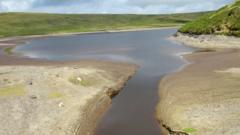Will Wales Experience a New Heatwave This Week?

Understanding the Current Water Levels and Weather Conditions in Wales
In Llyn Aled Isaf, Conwy County, the water levels in the reservoir have recently declined. However, Dŵr Cymru is currently not concerned about drinking water levels. With predictions of a second heatwave expected to hit Wales within a week, temperatures in Cardiff could soar to 29°C according to forecasts. This hot weather is expected to last until the weekend, although cooler conditions are anticipated in North Wales and coastal areas.
As Natural Resources Wales declares dry conditions in South East Wales, it marks the driest six-month period in nearly 50 years. Dŵr Cymru has stated that there are no plans to impose restrictions on water usage, but residents are encouraged to be cautious during the upcoming heatwave.
Community Support During the Heatwave
Isla Arandell, the manager of the TogetherWorks Community Centre in Caldicot, Monmouthshire, is urging locals to utilize the centre as a "cool place" to meet others away from hot and cramped environments at home. This initiative stems from a winter concept aimed at providing warmth, now transformed into a summer necessity.
“We are looking to create a cool space where people can come in and relax. We have a lovely community garden where people can sit,” she added. Over 100 electric fans, supplied to the centre by the South East Wales Energy Agency, have been distributed, and they have proven to be very popular. “I've just had two people come in this morning, but unfortunately, we only have a few fans left - perhaps we can get more,” she stated.
Keeping Cool at Home
John Hubbard, a 72-year-old attending the men’s breakfast club, shares his efforts to keep his home cool. “It’s counterintuitive to what we usually do in this country, but closing the windows, even if it’s really hot, is the thing to do,” he advised. He noted that their best room is the living room, but their bedroom faces south, which means they get full sun exposure.
Another resident, 81-year-old Tony Knight, enjoys the warm weather as long as it doesn’t get too hot. “I go out every day for a walk, but if it’s too hot, I walk around the supermarkets, and it’s nice,” he mentioned, highlighting the importance of adapting to the warmer temperatures.
Challenges in Care Homes
Residents of care homes often have fewer options regarding where they can go to stay cool. At the Pen-Y-Bont care home in Abertyleri, Blaenau Gwent, staff are working to maintain cooling communal spaces using an air conditioning system. Luke Griffiths from the home emphasizes the importance of ensuring residents stay hydrated. “We think ahead; we monitor how much fluid our residents are taking, we set fluid targets for each resident, we encourage regular breaks for our staff, and we ensure proper ventilation in the building,” he stated.
John Greenland, a 65-year-old resident, expresses his discomfort with the hot weather. “I don’t like it. If I’m hot, I try to cool down a bit. I drink a lot. I get very hot and sweat a lot,” he shared. The challenges posed by the heat are particularly pronounced for the elderly, who may struggle more with the rising temperatures.
On the other hand, 80-year-old Martha Lowman is not keen on the prospect of more hot weather. “I’m not very keen on it, but there’s not much we can do about it. I like to stay in the shade and drink plenty of fluids. It's really tiring,” she said, reflecting on how unusual it is for them to experience such heat. “When I lived in Australia, it was normal there, but this isn’t normal for us,” she added.
Future Weather Patterns
Sabrina Lee, a BBC meteorologist, suggests that we may need to adapt to this type of weather more frequently. “We expect our summers to be hotter and drier. We anticipate heatwaves to occur more frequently and intensely, leading to increased concerns about wildfires and drought in the future,” she explained.
She added that we might need to change how we carry out tasks we often take for granted. “I believe the tone of my forecasts will become more serious. We expect to have to adapt in the years to come, so we may need to change our daily habits. For example, when we take the dog for a walk, or if you work outdoors, you’ll need to adjust your schedule to avoid some of the heat,” she remarked.
Staying Safe in the Heat
For those planning to be outdoors during the hot weather this weekend, advice from Celyn-Mai Clement, 23, of St John Ambulance, includes “make sure you’re drinking enough water to avoid dehydration, wear a hat and sunglasses to protect your eyes.” She also recommends covering up using loose, lightweight clothing, but the best advice is to use sunscreen.
Natural Resources Wales has indicated that this is the driest six-month period since 1976, and that’s why Rhian Thomas from NRW states that the threshold has been reached to place South East Wales in dry conditions. “Significant rainfall shortages have affected the environment, and we are receiving reports of low flows and dry riverbeds in some locations, low groundwater levels as well as reports of fish in distress and algal blooms,” she noted.
Despite these conditions, a spokesperson for Dŵr Cymru reassured that there is currently no shortage of drinking water. “We have no concerns regarding reservoir levels across our operational area, with most levels being close to what we would expect at this time of year. We are managing the additional demand associated with the dry weather by maintaining storage within our water reservoir network, but at this time, we have no plans to implement any temporary restrictions on use,” they confirmed.
Preparing for Future Heatwaves
As Wales braces for what could be the third heatwave in 2025 with temperatures expected to rise above 30°C, it begs the question: Is it time to reconsider how we discuss hot weather? The rising temperatures are not just a temporary inconvenience; they are indicative of a broader climate trend that could redefine our seasonal expectations and emergency preparedness strategies.
Communities, local authorities, and individuals must collaborate to ensure that everyone, especially vulnerable populations, is equipped to handle the increasing temperatures. This might involve creating more cooling centers, providing better resources for hydration, and ensuring that people are educated about the risks associated with extreme heat.
As we navigate these changing climate conditions, it is crucial to remain vigilant and proactive. Are we ready to adapt our lifestyles to accommodate the rising temperatures and ensure the well-being of all members of our community?
FAQs
What measures can I take to stay cool during a heatwave?
To stay cool during a heatwave, consider the following tips: keep windows closed during the hottest parts of the day, use fans or air conditioning, stay hydrated, wear lightweight clothing, and limit outdoor activities to cooler parts of the day.
How can I help vulnerable individuals during extreme heat?
You can assist vulnerable individuals by checking in on them, ensuring they have access to water and cooling spaces, and encouraging them to stay indoors during peak heat hours.
What should I do if I experience heat exhaustion?
If you experience heat exhaustion, move to a cooler place, drink water, and rest. If symptoms worsen or do not improve, seek medical attention immediately.
As we face the reality of hotter summers ahead, how prepared are you to adjust to these changes? #ClimateChange #Heatwave #CommunityCare
```Published: 2025-08-15 13:01:27 | Category: wales



